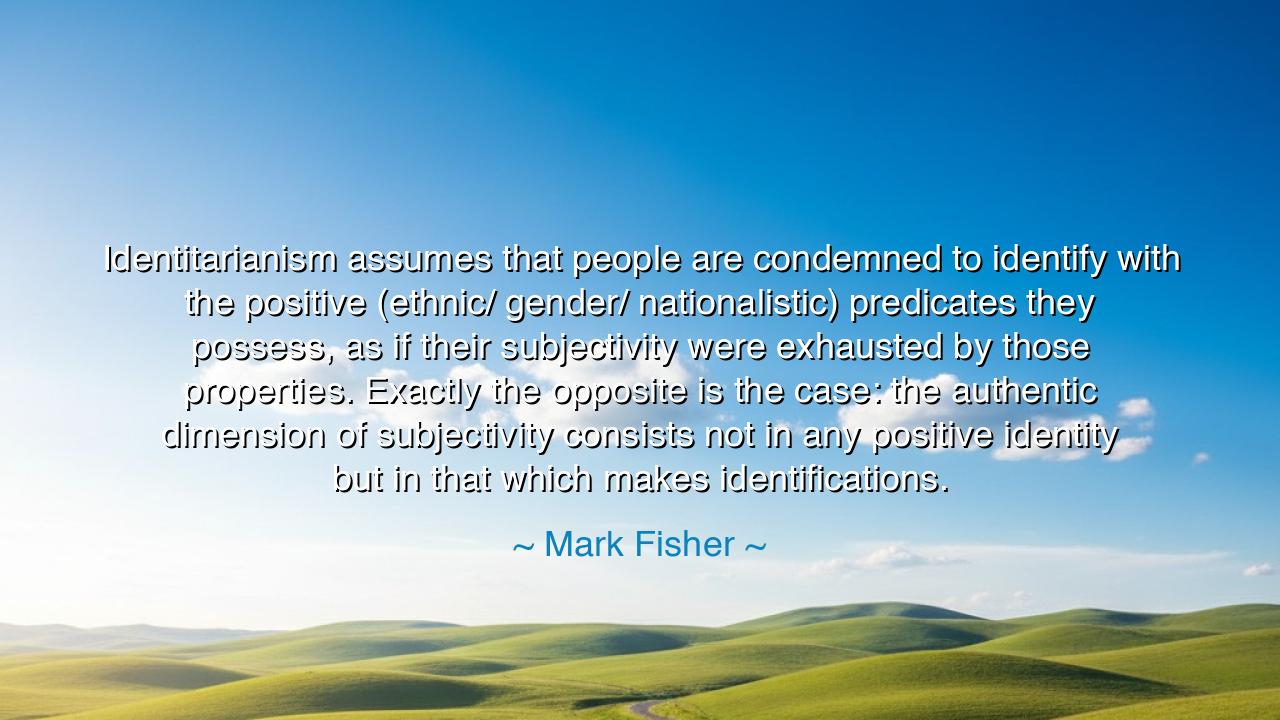
Identitarianism assumes that people are condemned to identify
Identitarianism assumes that people are condemned to identify with the positive (ethnic/ gender/ nationalistic) predicates they possess, as if their subjectivity were exhausted by those properties. Exactly the opposite is the case: the authentic dimension of subjectivity consists not in any positive identity but in that which makes identifications.






Ray J, in his simple yet profound utterance, declares: “I think we just need to keep moving forward in a positive way.” These words hold the fragrance of timeless wisdom. For the path of life is long, filled with stumbling stones and unexpected storms. Yet the essence of survival and greatness lies not in avoiding hardship, but in continuing the journey with faith, hope, and a vision for light. To move forward is to align oneself with the eternal rhythm of the cosmos, which never halts, never looks backward, but endlessly unfolds.
To understand his words, we must first see the dual command: not only to move forward, but to do so “in a positive way.” For forward movement without hope may become despair, and forward movement without virtue may lead to ruin. History is filled with kings and conquerors who pressed forward, but not positively, and their empires crumbled in blood. Ray J’s teaching is different—it is the reminder that true progress is not only measured in distance, but in spirit, in the uplifting of self and others.
Consider the story of Abraham Lincoln, whose life was a string of failures before greatness. He lost elections, lost businesses, lost loved ones. Yet he moved forward. More importantly, he carried himself “in a positive way,” believing in unity rather than division, in freedom rather than bondage. Out of his perseverance came the preservation of a nation and the liberation of millions. Had he pressed forward with bitterness or vengeance, history might have remembered him differently. His greatness was not in motion alone, but in the nobility of the direction.
The ancients, too, would echo this truth. The Stoics taught that when hardship comes, it is not the hardship itself that matters, but how we choose to bear it. One may be thrown into prison and emerge broken, or one may emerge like Boethius, who in his exile and captivity wrote The Consolation of Philosophy, a work that still strengthens souls centuries later. He too chose to move forward positively, turning sorrow into wisdom, and misfortune into legacy.
From Ray J’s words, we learn that life does not pause for us to grieve indefinitely. We must honor our pain, yes, but then rise again, take one step, and then another. The positive way is not naïve optimism but the strength to transform wounds into wisdom, scars into stories, and mistakes into lessons. It is to become the kind of person who, even in struggle, inspires others to endure.
Practically, this wisdom can be lived by setting small but steady goals after hardship, by surrounding oneself with voices of encouragement rather than despair, and by keeping alive practices of gratitude. One may write daily of three blessings, however small; one may reframe each failure as a step of preparation. To move forward positively is to be intentional with the mind and disciplined with the heart.
So let Ray J’s words be carried as a banner: the path of life is forward, and the manner of walking must be guided by positivity. Let us not be chained by regret nor poisoned by bitterness. Let us press on with courage, lifting ourselves and others. For the river of time flows ever onward, and the soul that moves with it in hope becomes unbreakable, unshaken, and eternal in spirit.






TSDo Thi Sen
This quote raises questions about how we define and pursue authenticity. Does focusing on the act of identification imply that identities are always provisional and negotiable? If so, how do we maintain coherence in our sense of self while continuously forming and reforming identifications? I’m also curious about how this framework applies to cultural, political, or artistic expression—does it allow for greater creativity in self-representation, or does it risk fragmenting the sense of who we are?
LC04. Pham Ngoc Lan Chi
Reading this, I wonder about the tension between collective identity and individual subjectivity. If authentic subjectivity is about the capacity to make identifications rather than the identities themselves, how do we balance social solidarity with personal autonomy? Are there risks in entirely rejecting positive identity markers, especially when they serve as tools for empowerment or recognition in historically marginalized communities? This seems like a complex ethical and political problem worth exploring.
NTThi thuy ngan Truong
It’s fascinating to consider subjectivity as a dynamic process rather than a collection of static traits. How does this view reconcile with the societal emphasis on belonging to defined groups? Does the notion of identification as the core of subjectivity suggest that our connections to others are more crucial than the categories we inhabit? I’d like to know whether Fisher sees this as a liberating idea or more of a critique of contemporary identity politics.
GDGold D.dragon
This perspective challenges the common assumption that identities are fixed and foundational to our sense of self. Does this mean that trying to ‘own’ a positive identity can be limiting or even reductive? I’m curious about what mechanisms allow people to recognize and cultivate the ‘authentic dimension’ of subjectivity. Are there philosophical or psychological practices that support this approach, and how might it transform our approach to personal and political identity?
CBCon Bau
I’m intrigued by the idea that our authentic selves lie not in predefined labels but in the act of identification itself. How does this concept interact with contemporary debates around identity politics? Could emphasizing identification over static traits allow for more empathy and understanding between groups, or would it risk undermining the visibility of marginalized communities? I’d like to hear examples of how this perspective might play out in real-world social contexts.